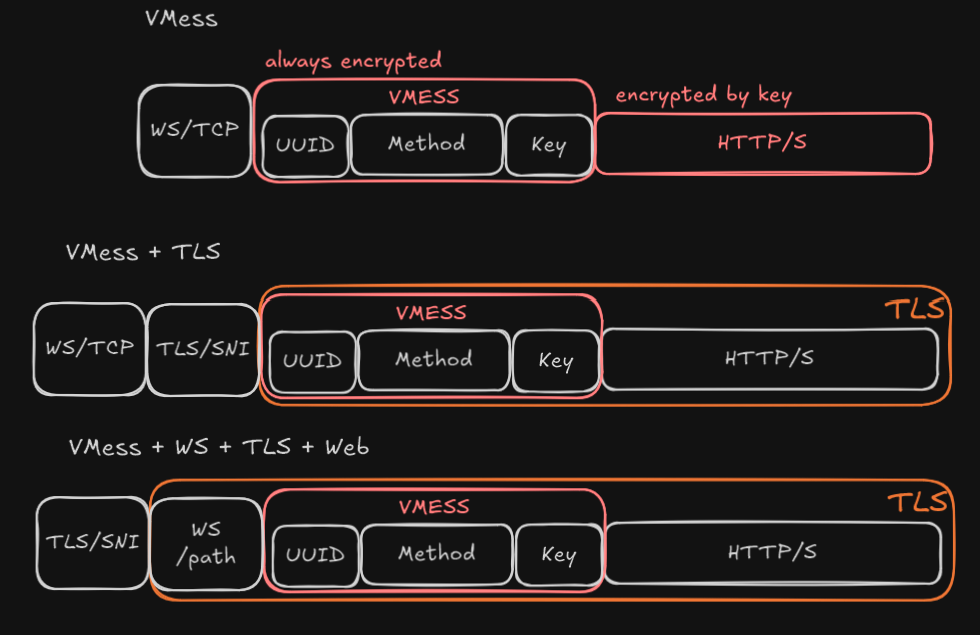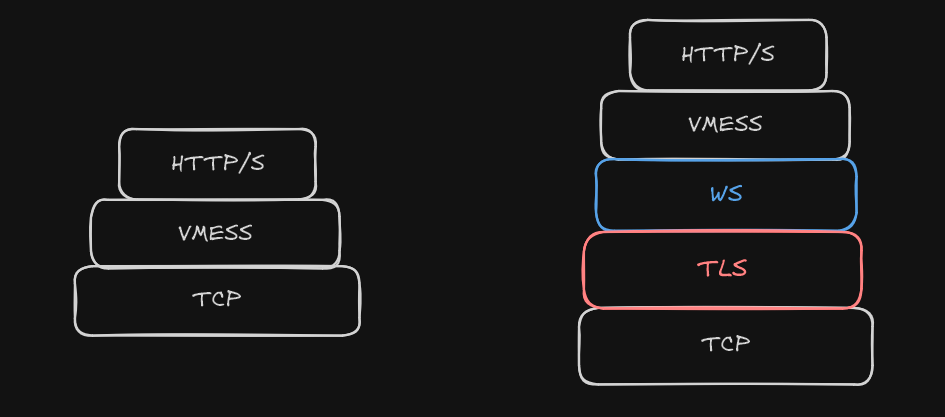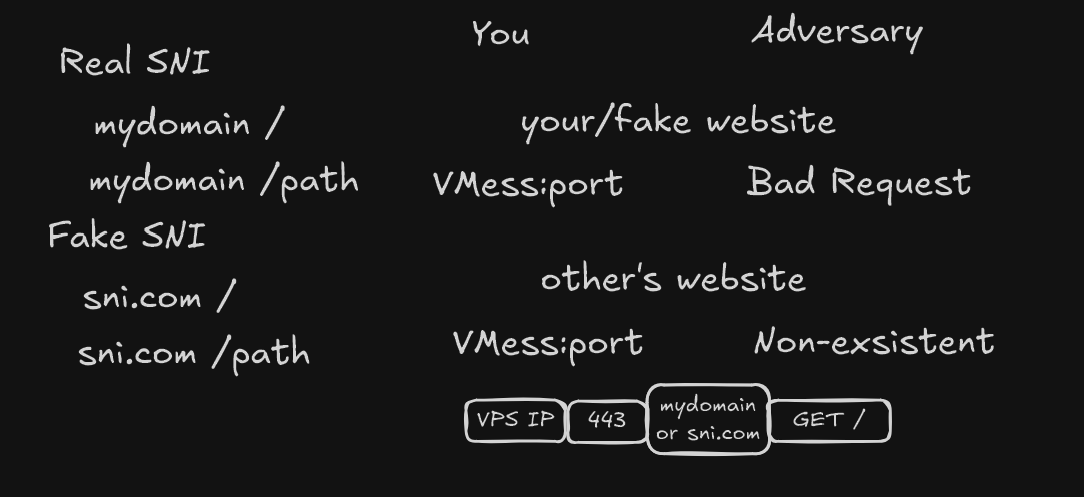https://youtu.be/y8s5UivMNcE
https://xtls.github.io/en/development/protocols/vmess.html#functions
Dependent on system time
Extra ID - generate another one other than UUID
AEAD, extra ID is 0
- either AEAD or ExtraID
VMESS vs V2Ray
There is a distinction between protocol (VMESS) and transport (tcp/ws in V2Ray). At its core, VMESS it’s just a protocol that can be transported in many ways, WebSocket or TCP
Transport vs Camoflouge
Transport: TCP/UDP/WS. determine how the VMESS or other traffic protocol is being transported to destination
Camouflage: add e.g. HTTP header to VMESS itself to hide it, it does not change how it’s transported
Install
bash <(curl -L https://raw.githubusercontent.com/v2fly/fhs-install-v2ray/master/install-release.sh)This will install v2ray in
/usr/local/bin # binary
/usr/local/etc/v2ray/config.json # main configuration
/etc/systemd/system/v2ray.service # systemd unitConfiguration change
sudo v2ray test /usr/local/etc/v2ray/config.jsonThe certificate installation is similar to Trojan, but for V2Ray, the path is
/usr/local/etc/v2ray/server.key # or server.crtConcept

Client
VMESS append the hash value to the beginning of the message
- client randomly take a value that is within 30s to be hashed
Server
VMESS check the hash based on timestamp - VMESS also append UUID to the timestamp
- take every time within +/- 30s and hash it to verify
VMESS/TCP
The most basic of VMess. Configuration.
{
"inbounds": [
{
"port": 8388,
"protocol": "vmess",
"settings": {
"clients": [
{
"id": "GENERATE ONE USING uuidgen",
"alterId": 0
}
]
}
}
],
"outbounds": [
{
"protocol": "freedom",
"settings": {}
}
]
}+WS + TLS

- these are optional,
- although WS with a path
/wsis required if hiding behind a website
To make use of WS in cli, add/change the line
"streamSettings": {
"network": "ws"
}- the
streamSettingsshould be added under settings - change the clients to use WS accordingly
TLS
When configuring TLS, the encryption method is set to zero
This will encrypt the entire VMESS packet
http/s -> VMESS -> WS (optional) -> TLS -> TCP -> IP
Add the following after streamSettings
"security": "tls",
"tlsSettings": {
"certificates": [
{
"certificateFile": "/usr/local/etc/v2ray/server.crt",
"keyFile": "/usr/local/etc/v2ray/server.key"
}
]
}Follow ACME to generate a certificate
If there are problems in the TLS process, edit the systemd unit file for v2ray and remove
User=nobodyIn v2ray client, change security to tls and add the SNI to match

TLS SNI Name
The SNI name is still the dynamic DNS and could be subject to SNI poisoning.
The SNI can be changed to anything, however, the TLS certificate is only issued for the DDNS domain, hence unless AllowInsecure is used, it won’t work.
Todo Later: understand certificate signing for a fake SNI
ChatGPT reference: https://chatgpt.com/share/67fa180a-4e28-800b-a7b4-8f379a9d0556
+Web

Hide VMESS with a website
Must use WS and reverse proxy (nginx)
- the advantage is that, normal web traffic is handled via Nginx rather than other software, making it genuine
Require a path, e.g./ray
Self-Built Site/Domain
If the domain/DDNS is not subject to SSL inspection, it can be used.
Upon configuring the website, the TLS termination is now handled by Nginx rather than V2Ray. Change the v2ray config
"streamSettings": {
"network": "ws",
"wsSettings": {
"path": "/wp-content"
}
}- remove all TLS related config in V2Ray
In the client setting
- change the port to what Nginx is listening on e.g. 443,444
- change the WS path to match
Nginx Configuration
Add the hosts in /etc/nginx/site-enabled
https://bulianglin.com/archives/guide.html
Change
- Line 2,3 - server listen port
- Line 5 - server name
- Line 6,7 - TLS certificate location (if different)
- Line 17,22 - reverse proxy to another website
- Line 32 - WS location
- Line 34 - port of V2Ray
Caddy
By default Caddy comes with automatic HTTPS, but also have ability to use own certificates
diamond.loyobank.com {
tls /usr/local/etc/v2ray/fullchain.pem /usr/local/etc/v2ray/privkey.pem
reverse_proxy http://localhost:12345 # or fake site
handle /wp-content { # ws path
reverse_proxy localhost:10081 # URL and listening port of VMESS
}
}- in Caddy, custom or self-signed certs can be declared with
tls cert key
Turn off V2Ray listening on 0.0.0.0 for security, add this line before port
"listen": "127.0.0.1"- the VMESS/WS will still work even after disabling the port in firewall
Fake SNI Name

- the WS path can be anything as this part will be encrypted with TLS
Conclusion
VMESS + pure TCP is faster but have problem of detection
- VMESS will encrypt the header no matter what
but with TLS, there’s more work of encryption
